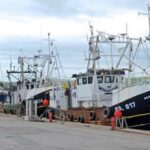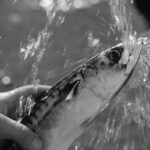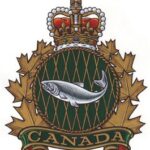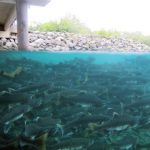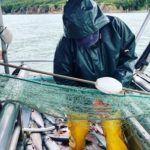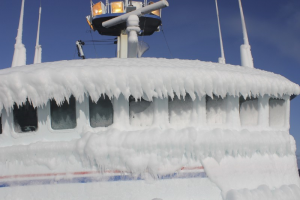Daily Archives: June 30, 2016
Fishermen condemn Labor candidate Lucy Stanton’s claims – Mark Jason Alexander, Commercial fisherman
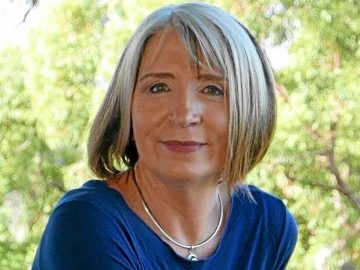 As commercial fishermen you expect some challenges, bad weather, fluctuating fish prices, bad seasons, but you do not expect to be falsely accused of a serious crime which has no basis and is totally untrue. We are concerned about the motives of Lucy Stanton given that she is a candidate for the Labor Party for the forthcoming election. As commercial fishermen we take pride in our product that we catch and get it to the market in the best possible condition. We also pay thousands of dollars in licence fees each year so as to keep operating. In addition to the licence fees we have an initial outlay of what can be in the hundreds of thousands of dollars. We are not about to risk our livelihood by doing something as stupid as firing weapons in a public place at night time as alleged. This is just totally untrue. Read the rest here 22:42
As commercial fishermen you expect some challenges, bad weather, fluctuating fish prices, bad seasons, but you do not expect to be falsely accused of a serious crime which has no basis and is totally untrue. We are concerned about the motives of Lucy Stanton given that she is a candidate for the Labor Party for the forthcoming election. As commercial fishermen we take pride in our product that we catch and get it to the market in the best possible condition. We also pay thousands of dollars in licence fees each year so as to keep operating. In addition to the licence fees we have an initial outlay of what can be in the hundreds of thousands of dollars. We are not about to risk our livelihood by doing something as stupid as firing weapons in a public place at night time as alleged. This is just totally untrue. Read the rest here 22:42
US Tuna Treaty survives, new deal for 2017 – Tunaboat Association comments on fishing pact
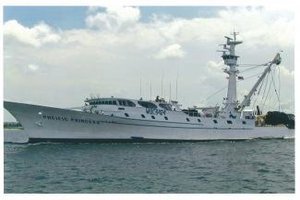 The US Tuna Treaty has survived after 18 negotiation meetings over the last seven years, with the latest one just concluded in Auckland, New Zealand. The multilateral Treaty is important for American Samoa because it allows US puirse seiners that supply our two canneries to fish in the exclusive economic zones of island countries that are close by. Read the rest here Tunaboat Association comments on fishing pact – The President of the American Tunaboat Association, Brian Hallman, says the fishing agreement reached over the weekend in Zealand between the United States and Pacific Island countries is from the point of view of the US fleet, the best outcome they could have achieved under difficult circumstances. Read the rest here Tri Marine looks to build coalition – Tri Marine International, which operates the Samoa Tuna Processors cannery in Atuu, says it has been anticipating a change in how the US purse seiners would manage access to the tuna fishing grounds in the Western and Central Pacific for several years. Chief Operating Officer of Tri Marine, Joe Hamby, says now that the future of the US South Pacific Tuna Treaty has been resolved, “we will be able to focus on building a coalition of fishing companies and resource owners committed to supporting American Samoa as a regional tuna processing hub.” Read the rest here 19:55
The US Tuna Treaty has survived after 18 negotiation meetings over the last seven years, with the latest one just concluded in Auckland, New Zealand. The multilateral Treaty is important for American Samoa because it allows US puirse seiners that supply our two canneries to fish in the exclusive economic zones of island countries that are close by. Read the rest here Tunaboat Association comments on fishing pact – The President of the American Tunaboat Association, Brian Hallman, says the fishing agreement reached over the weekend in Zealand between the United States and Pacific Island countries is from the point of view of the US fleet, the best outcome they could have achieved under difficult circumstances. Read the rest here Tri Marine looks to build coalition – Tri Marine International, which operates the Samoa Tuna Processors cannery in Atuu, says it has been anticipating a change in how the US purse seiners would manage access to the tuna fishing grounds in the Western and Central Pacific for several years. Chief Operating Officer of Tri Marine, Joe Hamby, says now that the future of the US South Pacific Tuna Treaty has been resolved, “we will be able to focus on building a coalition of fishing companies and resource owners committed to supporting American Samoa as a regional tuna processing hub.” Read the rest here 19:55
It happens! ‘Deadliest Catch’ Skipper Sean Dwyer busted for gear infraction
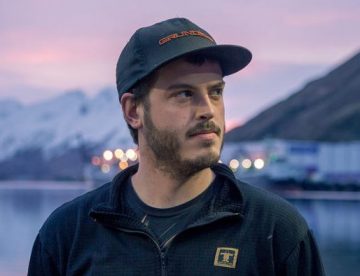 “Deadliest Catch” star Captain Sean Dwyer is in trouble with the law. Alaska’s Fish and Game officials fined Dwyer for some issues with his crab-catching equipment. The rules states that crab pots must have an 18-inch flap to allow the crab to escape, should it find its way back into the ocean. Dwyer’s crab pot only had a 15-inch flap, which has reportedly been fixed. The reality star reportedly paid $1,500 in fines and is now on probation for two years. Dwyer is the youngest captain of the Brenna A ship at 24 years old. It’s his first season with the hit Discovery series that has been airing for 12 seasons. Read the rest here 17:56
“Deadliest Catch” star Captain Sean Dwyer is in trouble with the law. Alaska’s Fish and Game officials fined Dwyer for some issues with his crab-catching equipment. The rules states that crab pots must have an 18-inch flap to allow the crab to escape, should it find its way back into the ocean. Dwyer’s crab pot only had a 15-inch flap, which has reportedly been fixed. The reality star reportedly paid $1,500 in fines and is now on probation for two years. Dwyer is the youngest captain of the Brenna A ship at 24 years old. It’s his first season with the hit Discovery series that has been airing for 12 seasons. Read the rest here 17:56
NMFS: Closure of Mid-Atlantic Scallop Access Area for Limited Access General Category Fleet
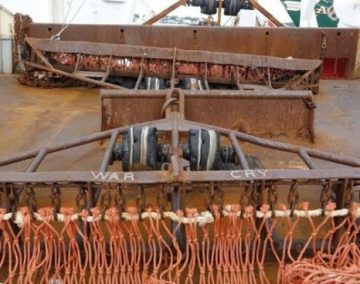 Effective at 0001 on July 4, we are closing the Mid-Atlantic Scallop Access Area to the Limited Access General Category (LACG) Individual Fishing Quota (IFQ) scallop fleet. We project that the 2016 LAGC IFQ has reached the Mid-Atlantic Access Area trip limit. The area will remain closed to the LAGC IFQ fleet for the remainder of the 2016 fishing year through February 28, 2017. Vessels that have complied with the observer notification requirements, declared a trip into the Mid-Atlantic Scallop Access Area using the correct Vessel Monitoring System (VMS) code, and crossed the VMS demarcation line before 0001 July 4, 2016, may complete their trip and retain and land scallops caught from the Mid-Atlantic Scallop Access Area. For more details, read the notice (pdf) as filed this afternoon in the Federal Register and the permit holder bulletin (pdf). To review the Atlantic Sea Scallop management areas, check out our story map. 17:23
Effective at 0001 on July 4, we are closing the Mid-Atlantic Scallop Access Area to the Limited Access General Category (LACG) Individual Fishing Quota (IFQ) scallop fleet. We project that the 2016 LAGC IFQ has reached the Mid-Atlantic Access Area trip limit. The area will remain closed to the LAGC IFQ fleet for the remainder of the 2016 fishing year through February 28, 2017. Vessels that have complied with the observer notification requirements, declared a trip into the Mid-Atlantic Scallop Access Area using the correct Vessel Monitoring System (VMS) code, and crossed the VMS demarcation line before 0001 July 4, 2016, may complete their trip and retain and land scallops caught from the Mid-Atlantic Scallop Access Area. For more details, read the notice (pdf) as filed this afternoon in the Federal Register and the permit holder bulletin (pdf). To review the Atlantic Sea Scallop management areas, check out our story map. 17:23Ministers divided over panel recommendation for northern shrimp fishery
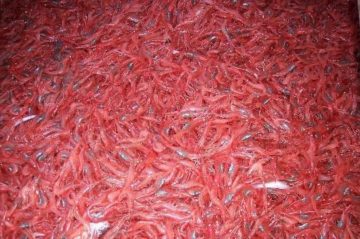 Nova Scotia Fisheries Minister Keith Colwell said he’s disappointed with the recommendation and is drafting a letter for federal Fisheries Minister Dominic LeBlanc to reiterate his views. Newfoundland and Labrador Fisheries Minister Steve Crocker said the current policy is unfair.A federal panel decision that recommends scrapping a northern shrimp policy that protects the pioneers of the multi-million dollar industry is dividing fisheries ministers in two Atlantic provinces. Under the current Last-In, First-Out policy, the last entrants to a fishery off Newfoundland and Labrador are the first to leave when a quota is cut. But the report released this week from an independent panel reviewing the policy said it does not allow the industry to adjust to changes in shrimp stocks, which have been in decline. The report recommends replacing the policy with an allocation regime that would include proportional shares in fishing areas. Read the rest here 17:02
Nova Scotia Fisheries Minister Keith Colwell said he’s disappointed with the recommendation and is drafting a letter for federal Fisheries Minister Dominic LeBlanc to reiterate his views. Newfoundland and Labrador Fisheries Minister Steve Crocker said the current policy is unfair.A federal panel decision that recommends scrapping a northern shrimp policy that protects the pioneers of the multi-million dollar industry is dividing fisheries ministers in two Atlantic provinces. Under the current Last-In, First-Out policy, the last entrants to a fishery off Newfoundland and Labrador are the first to leave when a quota is cut. But the report released this week from an independent panel reviewing the policy said it does not allow the industry to adjust to changes in shrimp stocks, which have been in decline. The report recommends replacing the policy with an allocation regime that would include proportional shares in fishing areas. Read the rest here 17:02
Following his exit from the IPHC, Kauffman calls violation ‘honest mistake’
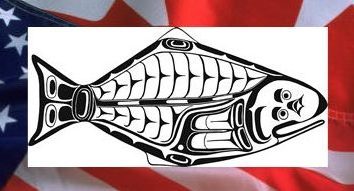 An executive from a Community Development Quota group blamed a regulatory mix-up for the fishing violation that forced him to resign from the international commission regulating halibut harvests. The National Oceanic and Atmospheric Administration Office of Law Enforcement charged Jeff Kauffman and two other men in March with possessing more than 10,000 pounds of halibut over their combined quota limits for a violation that occurred in June 2012. Kauffman is the vice president of the Central Bering Sea Fisherman’s Association, the Community Development Quota group for the island of St. Paul. He resigned on June 22. The joint U.S.-Canadian body has governed halibut quotas and regulations by international treaty since 1923, and has three commissioners each from the U.S. and Canada. Kauffman chalked the violation up to a regulatory mix-up. The violation occurred around June 5, 2012, while Kauffman fished for halibut around St. Paul with Mike Baldwin and Wade Henley, the captain of the F/V Saint Peter. CBSFA owns 100 percent of the vessel. Read the story here 14:49
An executive from a Community Development Quota group blamed a regulatory mix-up for the fishing violation that forced him to resign from the international commission regulating halibut harvests. The National Oceanic and Atmospheric Administration Office of Law Enforcement charged Jeff Kauffman and two other men in March with possessing more than 10,000 pounds of halibut over their combined quota limits for a violation that occurred in June 2012. Kauffman is the vice president of the Central Bering Sea Fisherman’s Association, the Community Development Quota group for the island of St. Paul. He resigned on June 22. The joint U.S.-Canadian body has governed halibut quotas and regulations by international treaty since 1923, and has three commissioners each from the U.S. and Canada. Kauffman chalked the violation up to a regulatory mix-up. The violation occurred around June 5, 2012, while Kauffman fished for halibut around St. Paul with Mike Baldwin and Wade Henley, the captain of the F/V Saint Peter. CBSFA owns 100 percent of the vessel. Read the story here 14:49
On this Day: June 30 – 1911: Coastal Steamer Nacoochee Runs Down Fishing Schooner Off Cape Cod.
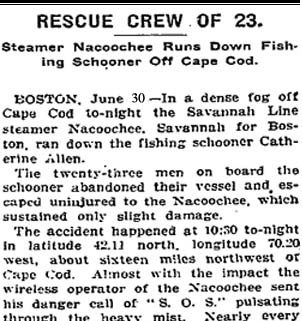 On this day in 1911 one of the many coastal steamers of the era sank a large fishing schooner 16 miles northwest of Provincetown. Since the canal was not completed yet, all ships had to sail a round the outer shore of Cape Cod, and the area was also rife with commercial fishing boats. The headline in the newspapers the next day blared: RESCUE CREW OF 23.; Steamer Nacoochee Runs Down Fishing Schooner Off Cape Cod. BOSTON, June 30. — In a dense fog off Cape Cod to-night the Savannah Line steamer Nacoochee, Savannah for Boston ran down the fishing schooner Catherine Allen… (Read the rest on the right.) Read the rest here 14:20
On this day in 1911 one of the many coastal steamers of the era sank a large fishing schooner 16 miles northwest of Provincetown. Since the canal was not completed yet, all ships had to sail a round the outer shore of Cape Cod, and the area was also rife with commercial fishing boats. The headline in the newspapers the next day blared: RESCUE CREW OF 23.; Steamer Nacoochee Runs Down Fishing Schooner Off Cape Cod. BOSTON, June 30. — In a dense fog off Cape Cod to-night the Savannah Line steamer Nacoochee, Savannah for Boston ran down the fishing schooner Catherine Allen… (Read the rest on the right.) Read the rest here 14:20
Global population’s of squid, octopuses and cuttlefish are booming
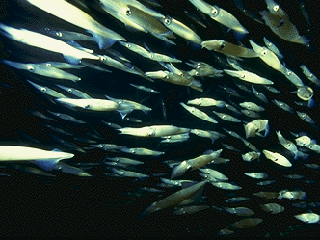 The world’s squid, octopuses and cuttlefish have been going through a massive, 60-year population boom, a new study has found. Published yesterday in Current Biology, the study shows a continued rise in population numbers of cephalopods since the 1950s. It also reveals the boom has happened in 35 species of cephalopods – covering six families – around the globe. Earlier research has found cephalopods, which are highly adaptable to changing environments, may be benefiting from a combination of climatic changes, including global temperature rises. University of Adelaide researcher Dr Zoe Doubleday led the study and found that despite anecdotal reports indicating a “boom and bust” cycle in cephalopod populations, since 1953 there had been a sustained increase. Link to the study here 11:51
The world’s squid, octopuses and cuttlefish have been going through a massive, 60-year population boom, a new study has found. Published yesterday in Current Biology, the study shows a continued rise in population numbers of cephalopods since the 1950s. It also reveals the boom has happened in 35 species of cephalopods – covering six families – around the globe. Earlier research has found cephalopods, which are highly adaptable to changing environments, may be benefiting from a combination of climatic changes, including global temperature rises. University of Adelaide researcher Dr Zoe Doubleday led the study and found that despite anecdotal reports indicating a “boom and bust” cycle in cephalopod populations, since 1953 there had been a sustained increase. Link to the study here 11:51
Getting Hooked! Fishermen can prepare for hooking injuries
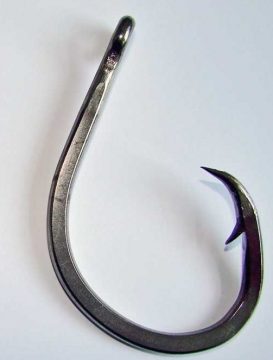 Many fishermen are familiar with the feeling of getting a fishhook stuck in their hand, arm or elsewhere. Usually, it’s a quick fix if the fisherman can jump in a car and head to an emergency room or to a clinic. However, if they are out in a boat on Cook Inlet or nine miles out on a remote river, (or out in the ocean) professional medical help may not be so immediately available. Being up to date on tetanus shots is a good preventative measure, said Dr. Rod Hall, a physician at Health North Family Medicine. Based on the kind of injury, the person will need a tetanus booster in the future — if it’s a clean cut, 10 years is fine, but if it’s not, five years is better, he said. Tetanus shots are available, but there is no antitoxin and the disease can be deadly. If fishermen want to take it out themselves, they should push the hook through the skin and flatten the barb against the hook with pliers before withdrawing it back the way it came out. Read the rest here 11:12
Many fishermen are familiar with the feeling of getting a fishhook stuck in their hand, arm or elsewhere. Usually, it’s a quick fix if the fisherman can jump in a car and head to an emergency room or to a clinic. However, if they are out in a boat on Cook Inlet or nine miles out on a remote river, (or out in the ocean) professional medical help may not be so immediately available. Being up to date on tetanus shots is a good preventative measure, said Dr. Rod Hall, a physician at Health North Family Medicine. Based on the kind of injury, the person will need a tetanus booster in the future — if it’s a clean cut, 10 years is fine, but if it’s not, five years is better, he said. Tetanus shots are available, but there is no antitoxin and the disease can be deadly. If fishermen want to take it out themselves, they should push the hook through the skin and flatten the barb against the hook with pliers before withdrawing it back the way it came out. Read the rest here 11:12
Last In First Out – Shrimp quota change may be ‘disastrous’ for Nova Scotia fishery
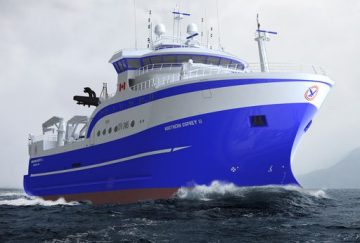 A massive decline in northern shrimp stocks off the northeastern coast of Newfoundland could cost Nova Scotia fish companies millions. That has one Nova Scotia fishermen worried about his own commitment to buy a $60-million factory freezer trawler that could fish year-round. “Changing the ground rules at this point in time could have a disastrous impact upon us,” said Liverpool’s Ulf Snarby. With partners in New Brunswick and Labrador, he has been fishing northern shrimp off the northeastern coast of Newfoundland, called Area 6, since 1977. Fishable shrimp stocks declined by 41 per cent in Area 6 from 2014 to 2015, the Department of Fisheries and Oceans reported in January. With that dramatic decline in the stock, many in the industry expect quotas to be reduced. That’s caused a fight to brew between fishermen in Newfoundland and those in Nova Scotia over who can fish what’s left. Read the rest here – The new $60 million factory freezer trawler Click here 10:34
A massive decline in northern shrimp stocks off the northeastern coast of Newfoundland could cost Nova Scotia fish companies millions. That has one Nova Scotia fishermen worried about his own commitment to buy a $60-million factory freezer trawler that could fish year-round. “Changing the ground rules at this point in time could have a disastrous impact upon us,” said Liverpool’s Ulf Snarby. With partners in New Brunswick and Labrador, he has been fishing northern shrimp off the northeastern coast of Newfoundland, called Area 6, since 1977. Fishable shrimp stocks declined by 41 per cent in Area 6 from 2014 to 2015, the Department of Fisheries and Oceans reported in January. With that dramatic decline in the stock, many in the industry expect quotas to be reduced. That’s caused a fight to brew between fishermen in Newfoundland and those in Nova Scotia over who can fish what’s left. Read the rest here – The new $60 million factory freezer trawler Click here 10:34
South Pacific Tuna Treaty renegotiation session concluded successfully
 The most recent South Pacific Tuna Treaty renegotiation session concluded successfully on Saturday, June 25, 2016. Negotiators from the United States and representatives of the 16 Pacific Island parties reached agreement in principle on changes to the 27-year-old Tuna Treaty and the terms of fishing access for the U.S. purse seine fleet to Pacific Island waters through 2022. The proposed agreement would establish more flexible procedures for commercial cooperation between U.S. industry and Pacific Island parties. The outcome reflects strong cooperation between the parties to the Treaty and relevant stakeholders, and a mutual commitment to the broader positive relationship between the United States and the Pacific Island region. Read the rest here 09:46
The most recent South Pacific Tuna Treaty renegotiation session concluded successfully on Saturday, June 25, 2016. Negotiators from the United States and representatives of the 16 Pacific Island parties reached agreement in principle on changes to the 27-year-old Tuna Treaty and the terms of fishing access for the U.S. purse seine fleet to Pacific Island waters through 2022. The proposed agreement would establish more flexible procedures for commercial cooperation between U.S. industry and Pacific Island parties. The outcome reflects strong cooperation between the parties to the Treaty and relevant stakeholders, and a mutual commitment to the broader positive relationship between the United States and the Pacific Island region. Read the rest here 09:46
Southeast Alaska Dungeness crabbers see full-length summer, fall seasons
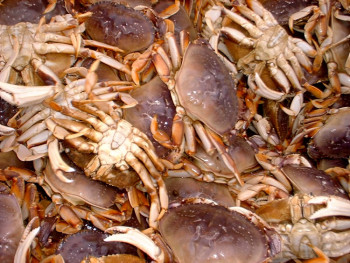 Commercial Dungeness crabbers have a full two-month summer and two-month fall season for most of Southeast Alaska again this year. The Alaska Department of Fish and Game announced this week the summer season would continue through August 15 and a fall season is planned for October and November. The season length is set based on the catch from the first week of fishing. Crabbing opened on June 15th. Adam Messmer, the department’s shellfish assistant manager for Southeast, says the total season catch is projected to wind up at 2.89 million pounds and the quality of the catch has started off well. “There’s a lot of people saying that there was really hard crab, full crab, not a lot of soft shell around, which is kindof an odd thing for this time of year, usually there’s at least a reasonable percentage of soft shell but it sounds like a lot of good, really high quality crab,” Messmer said. Read the rest here 09:31
Commercial Dungeness crabbers have a full two-month summer and two-month fall season for most of Southeast Alaska again this year. The Alaska Department of Fish and Game announced this week the summer season would continue through August 15 and a fall season is planned for October and November. The season length is set based on the catch from the first week of fishing. Crabbing opened on June 15th. Adam Messmer, the department’s shellfish assistant manager for Southeast, says the total season catch is projected to wind up at 2.89 million pounds and the quality of the catch has started off well. “There’s a lot of people saying that there was really hard crab, full crab, not a lot of soft shell around, which is kindof an odd thing for this time of year, usually there’s at least a reasonable percentage of soft shell but it sounds like a lot of good, really high quality crab,” Messmer said. Read the rest here 09:31
Post-Brexit, north Queensland fishermen consider trade opportunities with the United Kingdom
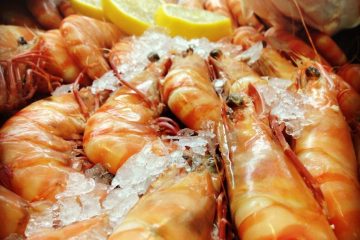 North Queensland fishermen are hoping that now the United Kingdom is to exit the European Union (EU) following the referendum last week, export markets could be re-vitalized. Many stopped exporting to the EU due to difficult protocols and high costs associated with their membership. That was exactly what Mackay Commercial fisherman David Caracciolo did, but he said he may now reconsider that decision if the UK does leave the EU. He believes with the UK split away, it would be much easier to build trade relations. “Previously, the testing regime has been very strict,” Mr Caracciolo said. “We have had lots of incidents in the past where stock, mainly prawns, have been tested in Australian [and] got into the EU and been rejected. “In saying that, the UK — to my knowledge — has not been a big market of Australian seafood but maybe things could change in the future. Read the rest here 08:56
North Queensland fishermen are hoping that now the United Kingdom is to exit the European Union (EU) following the referendum last week, export markets could be re-vitalized. Many stopped exporting to the EU due to difficult protocols and high costs associated with their membership. That was exactly what Mackay Commercial fisherman David Caracciolo did, but he said he may now reconsider that decision if the UK does leave the EU. He believes with the UK split away, it would be much easier to build trade relations. “Previously, the testing regime has been very strict,” Mr Caracciolo said. “We have had lots of incidents in the past where stock, mainly prawns, have been tested in Australian [and] got into the EU and been rejected. “In saying that, the UK — to my knowledge — has not been a big market of Australian seafood but maybe things could change in the future. Read the rest here 08:56

































